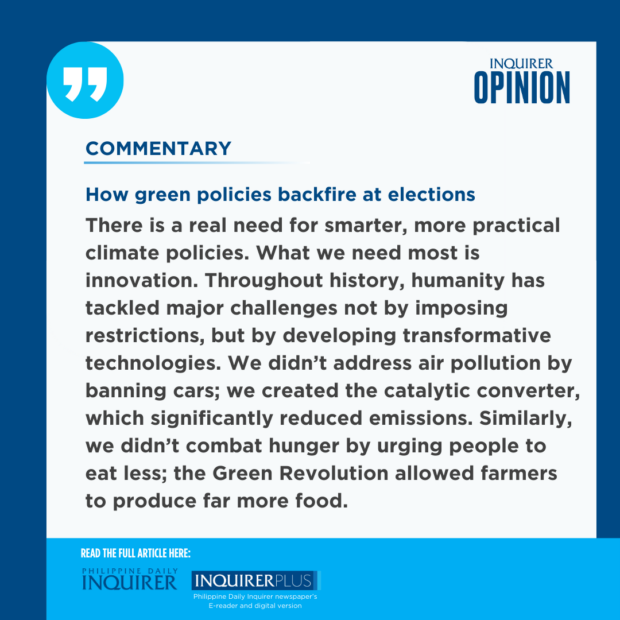
As local weather coverage more and more drives up dwelling prices with subsequent to no outcomes, voters have gotten wearier of expansive inexperienced guarantees. We will solely hope this backlash may result in higher, cheaper, and more practical measures.
Voters are inevitably viewing local weather insurance policies with extra skepticism, after coping with local weather activists blocking roads and gluing themselves to runways, celebrities who take personal jets whereas lecturing us about taking the bus, and insurance policies that price the world however ship little. The transformation has been mirrored in rightward shifts in varied European international locations within the European Union (EU) elections and a broad notion of a “inexperienced backlash.”
Germany’s vitality coverage was famously promised to price the general public merely the equal of 1 scoop of ice cream every month. Now, as prices have far surpassed half a trillion euros, the per-person price ticket appears extra corresponding to a whole ice cream truck. Equally, in the UK, Germany, and the USA, the crippling prices to households of insurance policies like changing gasoline stoves or boilers have change into evident, resulting in repeated political reversals.
Article continues after this commercial
On the whole, what we’re seeing exemplifies what local weather economists have lengthy warned: insurance policies pushing a transition to greener vitality are inherently pricey.
McKinsey and Co. estimates that the price of transitioning from fossil fuels to inexperienced vitality would exceed $5 trillion yearly, and up to date financial estimates present that the ensuing slowing financial development may make the actual financial influence 5 occasions larger. For the common particular person in wealthier nations, this interprets into unaffordable prices of about $13,000 yearly.
On the similar time, local weather insurance policies are delivering a lot lower than promised. The Biden administration’s Inflation Discount Act was hailed for its potential to dramatically decrease emissions quickly this decade for $369 billion. It seems the value may run within the trillions, and the temperature influence is far smaller. In Germany, landmark laws to modify to inexperienced vitality has achieved subsequent to nothing: in 2010, 79.6 % of German vitality was powered by fossil gasoline whereas 12 years later, it had declined by simply 0.3 proportion factors to 79.3 %.
Article continues after this commercial
The shrillness of local weather doom additionally wears down voters. Whereas local weather change is an actual and man-made drawback, fixed end-of-the-world proclamations from media and campaigners massively overstate the scenario. Whereas local weather economics exhibits the general influence of world warming is unfavorable, its possible complete influence is equal to at least one or two recessions over the remainder of the century—an issue, however nowhere close to end-of-world.
And, after all, voters face many different issues: inflation, well being care, schooling, and safety. Polling knowledge illustrates a shift in sentiment. For example, forward of the EU elections, German voters revealed a major drop in local weather concern. In the USA, local weather change stays a lesser concern, with local weather change rating twelfth of 14 priorities.
There’s a actual want for smarter, extra sensible local weather insurance policies. What we want most is innovation. All through historical past, humanity has tackled main challenges not by imposing restrictions, however by growing transformative applied sciences. We didn’t tackle air air pollution by banning vehicles; we created the catalytic converter, which considerably lowered emissions. Equally, we didn’t fight starvation by urging individuals to eat much less; the Inexperienced Revolution allowed farmers to supply way more meals.
Nevertheless, for the previous 30 years, innovation in inexperienced vitality has been sorely uncared for. Again in 1980, developed international locations allotted over 8 cents of each $100 of GDP to analysis into low-carbon applied sciences. However as local weather insurance policies shifted towards making fossil fuels dearer, spending on inexperienced innovation fell by half, right down to lower than 4 cents per $100. Funding in inexperienced vitality analysis has been proven to yield important advantages. Research point out that each greenback invested in inexperienced analysis and growth (R&D) may forestall $11 in long-term local weather damages, making it arguably the best world local weather coverage accessible.
When R&D ultimately drives the price of inexperienced vitality beneath fossil fuels, everybody will change—not simply wealthy international locations, however crucially additionally China, India, and Africa.
Persistence with at this time’s massively costly however ineffective local weather insurance policies is carrying skinny. Fortuitously, this might be the push we have to change observe and give attention to less expensive innovation that might truly repair local weather change.
—————-
Bjorn Lomborg is president of the Copenhagen Consensus, visiting fellow at Stanford College’s Hoover Establishment, and writer of “False Alarm” and “Greatest Issues First.”

